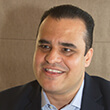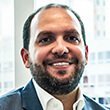The digital future of finance
CFOs gain growing leadership before the technological revolution that redefines their role. The innovations bring greater efficiency to processes, but require a more analytic profile from the executive.
April-June | 2017The interconnected world brings a huge amount of information and expands the need for more and more responsive answers to the business. Digital technologies, many of them disruptive, arise every time and take the Chief Financial Officer (CFO) from his old insulation to become one of the main business partners. The need to transition from old models (called legacy systems, such as mainframes) to the 100% digital ones will make the CFO to incorporate new skills to his profile. The possibility of data structuring and access to quality information in less time will release the financial intelligence to the relationship with all areas of the organization and even the external public of interest.
The study “Crunch Time – Finance in a digital world”, conducted by Deloitte with CFOs from companies from all over the world, has identified seven new tools that indicate how to overcome the challenge of staying updated and maintaining the business plan, embracing the new phase in a responsive way. These innovations are, albeit in crude form, already in humanity’s daily routine, but need to be adopted and headed by the finance team to give results to companies.

The answer to this transformation creates the demand for a new CFO profile, with great analytical ability and with strong relational development. In summary, the new technological tools will be allies with the CFO and will cause the company to be even more dependent on his team. It is necessary to adapt and be attentive to the fourth digital revolution to not lose real profit opportunities, in addition to building a more efficient business model, which leads to the strengthening of the image and the global brand.
“The big problem in the financial world is when you have to guess about something. The technology reduces the interference of intuition for decision-making. Decisions become more assertive, there is gain in efficiency and less subjectivity,” says Othon Almeida, Deloitte Brazil’s leader of the CFO Program and Market Development. In this transformation, the financial areas are to enter into all the nuances and decisions, becoming a vector. It is time to take center stage. The technology and the digital factor bring new elements that structure data in large volume and eliminate intuition from the process.
"The big problem in the financial world is when you have to guess about something. The technology reduces the interference of intuition for decision-making. The decisions become more assertive, there is gain in efficiency and less subjectivity."
Othon Almeida, Deloitte Brazil’s leader of the CFO Program and Market Development
The new tools must be accompanied by renewal of the CFO vision, in addition to the capacity of the finance team in terms of analytical processing, statistics knowledge and relationship. The purpose of these technologies is freeing time of professionals, so that they can dedicate more to the business understanding. “The new CFO must be able to analyze data and, at the same time, talk with the commercial area to discuss issues related to pricing and discount policies. He should talk to the Human Resources department, assisting in matters of payroll, bonuses. He must understand operations, discuss expenditures. This new profile will allow the professional to know all areas and gain more relevance,” says Fabio Perez, director of Deloitte’s CFO Program and leader of Finance consulting in Brazil.
"Business leaders who want to compete in the digital world will need help from the CFO to process more information, with the greatest possible speed, and transform these data into deep insight. This requires new technologies and a curious and empowered team to use them."
Fabio Perez, director of Deloitte's CFO Program and leader of Finance consulting in Brazil
Sandy Cockrell, global leader of Deloitte’s CFO Program: the technology is an ally to unite the processes to strategy and gain efficiency
Sandy Cockrell, global leader of Deloitte’s CFO Program, says that organizations need to understand that the finance area of is an essential part of the structure, because, with the new technological scenario, this is the area that creates and disseminates information from data. “And this has to be done with the right technology. We must have a finance area which understands how the company makes money and how to combine this with the strategy. Right people, appropriate processes and tools. The CFO is the only one who can go to all areas of an organization and ask the question he wants. It is necessary to consider this to achieve operational efficiency,” says Cockrell.
Prepared for the transition
To fit to the new technologies, it is necessary to assess at what stage the organization is and, from there, trace the strategy for a gradual transition. To do this appropriately, CFOs can begin mapping out a finance transformation, focusing on the company’s champion features. “You should have a master plan in mind, but do one step at a time, because everything is changing rapidly. Don’t make big bets until you feel prepared and understand the potential risks”, recommends Othon Almeida, from Deloitte.
The new players, companies that have already been born digital, such as the startups and the fintechs, already work on a 100% online platform, called the third platform, explains Adriano Chemin, Oracle’s vice president for Latin America. For Chemin, these innovative companies must inspire the transition of those seeking to update. The digital natives are on the third technological platform and work integrating cloud, big data, mobiles and social business. They are in great advantage in this aspect, because everything that is built with the native third platform concept has more agility.

Who has a first platform (which uses terminals and mainframes) or second platform (internet and lan) legacy has more difficulty in performing the process changes. “‘I want to integrate Internet of Things to my management process. Can I?’ You can, but you must build the entire integration process with technologies from different generations. All this takes time and money. The more updated, better for the company. I think that the transition is not a matter of choice, it is a matter of time”, says Chemin.
And the future?
The main bets, per the CFOs heard by Mundo Corporativo, are cognitive computing, cloud, robotics and blockchain, for its potential to promote greater disruption and for being exponential. Robotics and cognitive computing are examples, in projects such as self-driving cars and autonomous call centers. One of the positive impacts of this technology is the increase in longevity.
“It is expected that the cost of things, by the use of technology, will decline because it automates the entire process, for example, in food production. Reducing this cost, the cost of food is reduced. When we say that it will be possible to work from anywhere in the world, it also solves population concentration problems and cost of living in large urban centers. It is expected that the population will live more with a lower cost of living,” says Adriano Chemin, from Oracle.
Digital from birth
Three native digital companies told us about their financial management experience
Peixe Urbano
In 2010, Peixe Urbano presented the concept of group shopping to the Brazilian consumer and created the niche of discount coupon sales for restaurants. Today, after the sale to China’s e-commerce giant Baidu, two years ago, CFO Graciela Ferrero credits the success of the brand, a digital native, to the integration of all areas, through inputs from the financial area.

“With the data analysis and visualization tools shared with everyone, we created a real-time information model. This allows for an agile and coordinated decision-making process. We do not wait for the month closing to see and share the results; we look at it at every moment. This leads to an efficiently concentration of efforts, with the ability to predict.” Graciela also points to the financial transparency as an aggregator of human capital. “Employees know where the company is at every moment.”
For the executive, the biggest challenge is to put all the generations in a same level of technological understanding. “We need to deal with all generations and train the digital natives in their weaknesses, such as the craving for immediate results, while at the same time we must integrate the previous generations to all platforms available. Only in this way everyone gets along and work in harmony.”
Banco Original
To Carlos André Hermensindo da Silva, Banco Original’s CFO, the great difficulties from a company that was not born digital are to overcome four entry barriers. “They are: determine the investment level needed to take the step forward, fear, attachment to the past model and, finally, the need to think the design. This will only be possible with a CFO who has a disruptive vision and who worries about seeking talents who can help in the transition.” Thus, per the executive, it will be possible to determine the steps for the technological transition and have the ability to engage and empower your human resources in the new platforms.

“A tip is the use of cloud, a very important and well disseminated tool, in addition to the inclusion in the planning of all new tools thinking in how to use the application programming interface (API) help. We use this in our openbanking, which allows a fintech’s solution to be connected with our system to create a means of payment. These advances make the operation more updated, and put us ahead.”
An already API use example is the map of how to get to a restaurant. When opening the Map, the user will be taken to Google Maps, which is an API designed to insert it in a certain location on the page.
“At Banco Original, we have already been born using the third wave technologies in internal processes, with customers and suppliers. Our innovation concept is thought by an exclusive team, which brings solutions before the market develops them on a large scale. We are the sector’s fastmovers and this gives us a differential, how to use faster the technologies like blockchain. It will be a reality in the near future.”
Pay Pal
For the Pay Pal’s CFO for Latin America, Lucas Medola, new technologies are essential for the companies’ growth, especially global ones, but also pose challenges to the people’s work rhythm. “Today my goal is daily, we cannot wait for the week, or the month. And in that, in addition to the autonomy that all areas must have, it is a must to be able to analyze everything in a fast, visual and correct way. Advanced analytics and visualization are fantastic for the financial solutions branch, but may not be essential for other sectors.”

Pay Pal began in the early 2000s as a means of payment company and has evolved to build integrated financial solutions. “The answers that I give to my customers need to follow the response time to internal processes. And this requires an entire shared planning. I know what each member of my team is doing, but each has its part in decision-making. With the new tools, I do this follow-up of priorities in real time.”
Medola affirms that the company making the transition needs to keep in mind that it cannot forget the core business. “It is useless to invest in technology and leave the business on the side. It is needed to do it together: look at the activity that brings return and gradually invest in the process improvement. Every company has limited resources, people and investment. Therefore, before doing so, it is necessary to investigate what will give more return. To know how much value the tools will bring, to then go into a planned deployment.”

